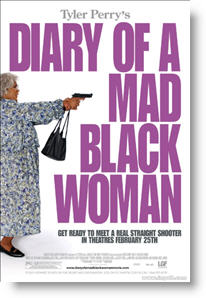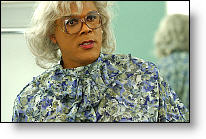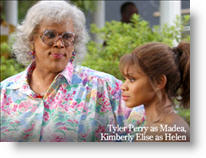Diary of a Mad Black Woman
 for drug content, thematic elements, crude sexual references and some violence..
for drug content, thematic elements, crude sexual references and some violence..
Reviewed by: Nicole Richardson
CONTRIBUTOR
| Moral Rating: | Offensive |
| Moviemaking Quality: |
|
| Primary Audience: | Adults |
| Genre: | Drama |
| Length: | 2 hr. 10 min. |
| Year of Release: | 2005 |
| USA Release: |









What are the consequences of sexual immorality? Answer
How can I deal with temptations? Answer
For a follower of Christ, what is LOVE—a feeling, an emotion, or an action?
What is true love and how do you know when you have found it?

Learn how to make your love the best it can be. Christian answers to questions about sex, marriage, sexual addictions, and more. Valuable resources for Christian couples, singles and pastors.
| Featuring |
|---|
| Kimberly Elise, Steve Harris, Tyler Perry, Shemar Moore, Lisa Marcos |
| Director |
|
Darren Grant |
| Producer |
| Tyler Perry, Reuben Cannon |
| Distributor |
Time heals the heart. Faith heals the rest.
“Diary of a Mad Black Woman” is the story of Helen (Kimberly Elise) whose world falls apart when her husband of 18 years replaces her with another woman. Helen has been the faithful and devoted wife of Charles (Steve Harris), supporting and encouraging him on his rise to becoming one of the most successful lawyers in the city. On the night of their 18th anniversary, Charles literally throws her out of the house to make room for his lover. Left with nowhere else to go, Helen turns to her grandmother, Madea (played broadly by Tyler Perry). Through the support of her family, including her cousin, Brian (Tyler Perry) and her mother (the wonderful Cicely Tyson), and through a relationship with a friend of the family, Orlando (Shemar Moore), Helen learns to forgive and find real love.
“Diary” has the potential to convey a wonderful, powerful message about forgiveness, redemption, and restoration. The problem comes with the vulgar sexual innuendo and mild profanity that you have to wade through to get to the message. Madea’s brother, Joe (also played by Tyler Perry) was a pot smoking, bawdy, foul-mouthed, lusty, inappropriate individual who adds nothing valuable to the movie. Just about all of the vulgar comments came from this character. He even made lustful comments about a member of his own family. There were many instances of mild profanity. The word “hell” was used more times than I could count. There were several instances of derogatory references to Charles’ girlfriend and the words “a**” and “d***” were used once. However, there was no use of the words “s***,” “f***,” or “b***.”
Madea made several comments about God and church that could be deemed inappropriate and offensive. When Helen’s mother tells Helen that God takes care of people that wrong you, Madea responds, “God takes too long.”
There is also a moderate level of violence in the movie, including many instances of abuse and several threats made with a gun. A major character is shot in the movie, although no blood is shown. The violence is not very graphic, but somewhat intense.
There is no sex or nudity, although sex is discussed, but not in a vulgar way (with the exception of Joe). Helen and Orlando are shown sleeping in the same bed, but they are both clothed, and the movie makes it very clear that they did not have sex. There is drug use—both Joe and Deborah, Brian’s estranged wife. Joe is shown smoking marijuana, and Deborah is obviously strung out for much of the movie. The character of Madea is played by a man, Tyler Perry (who is also the screenwriter.
“Diary” delivers an admirable message about forgiveness. Helen is understandably angry and bitter over what has happened to her and has a difficult time at first following Ephesians 4:31,32 — “Let all bitterness, wrath, anger, clamor, and evil speaking be put away from you, with all malice. And be kind to one another, tenderhearted, forgiving one another, even as God in Christ forgave you.” In fact, Helen’s rage takes her down a very dark (and somehow unbelievable) path for a while. It takes the words of her devout, praying mother (and where would we all be without those?) to help her see that holding on to her rage is separating her from her own joy and hurting her relationship with God.
Helen and Orlando’s relationship does not go beyond cuddling (albeit in a bed overnight), because Orlando is portrayed as a Christian man. While I admire the movie for restricting Helen and Orlando’s intimacy, I can’t help but think about Matthew 26:41 — “Watch and pray, lest you enter into temptation. The spirit is indeed willing, but the flesh is weak.” Laying in bed with someone, even if you are clothed, is inviting temptation, no matter who you are and what your level of faith may be. Helen’s husband, Charles, completely ignores Colossians 3:19 — “Husbands, love your wives and do not be bitter toward them.” He is incredibly cruel to her and certainly does not her as Christ loved the church (Ephesians 5:25-31).
Overall, I did enjoy “Diary of a Mad, Black Woman,” but I felt uncomfortable with some of the sexual comments. I did not feel that it was a well-written movie, and there were many things that did not make sense, but it was entertaining. I think the PG-13 rating is appropriate, although I would highly recommend discussing the movie with teenagers afterward. I would especially discuss the abuse, infidelity, and drug use in the film. I would also talk about how to forgive those that wrong you, and how unforgiveness can poison one’s relationship with God. Overall, this film has a terrific message, but it is obscured by crude, unnecessary comments.
Violence: Moderate / Profanity: Mild / Sex/Nudity: Mild
See our list of “Relevant Issues.”
See our review of the sequel to this film, Tyler Perry’s Madea’s Family Reunion.


Better than Average/5
Good/4½
Moral rating: Good / Moviemaking quality: 5
Better than Average/5
Average/4
WARNING: This movie has sexual innuendos that make this movie unable to be redeemed. One sexual innuendo refers to anal intercourse between an old uncle and his recently separated niece. This type of thing is rarely seen in the worst of Hollywood usually reserved for hard core pornography. Marijuana, and alcohol abuse are laughed at and taken very lightly. On the other hand in a different situation a hardcore drug addict rehabilitates and eventually winds up in church. Giving the overall idea that some types of drug/alcohol abuse are tolerable while others are considered problematic.
One last point. The idea of people taking vengeance into their own hands is somewhat glorified which is antithetical to the Biblical message for Christians. The feel of the movie has that usual cheesy movie feel you get from Christian movies, yet is extremely offensive which makes it a complete flop. This whole movie has a sick mixture of EXTREME pagan ideology and Christian values. I would say this is probably one of the worst movies I have ever seen.
Extremely Offensive/1
Better than Average/4½
“…a high-minded melodrama joined at the hip with low-comedy, borderline vulgar shenanigans…

My Ratings: Better than Average/5